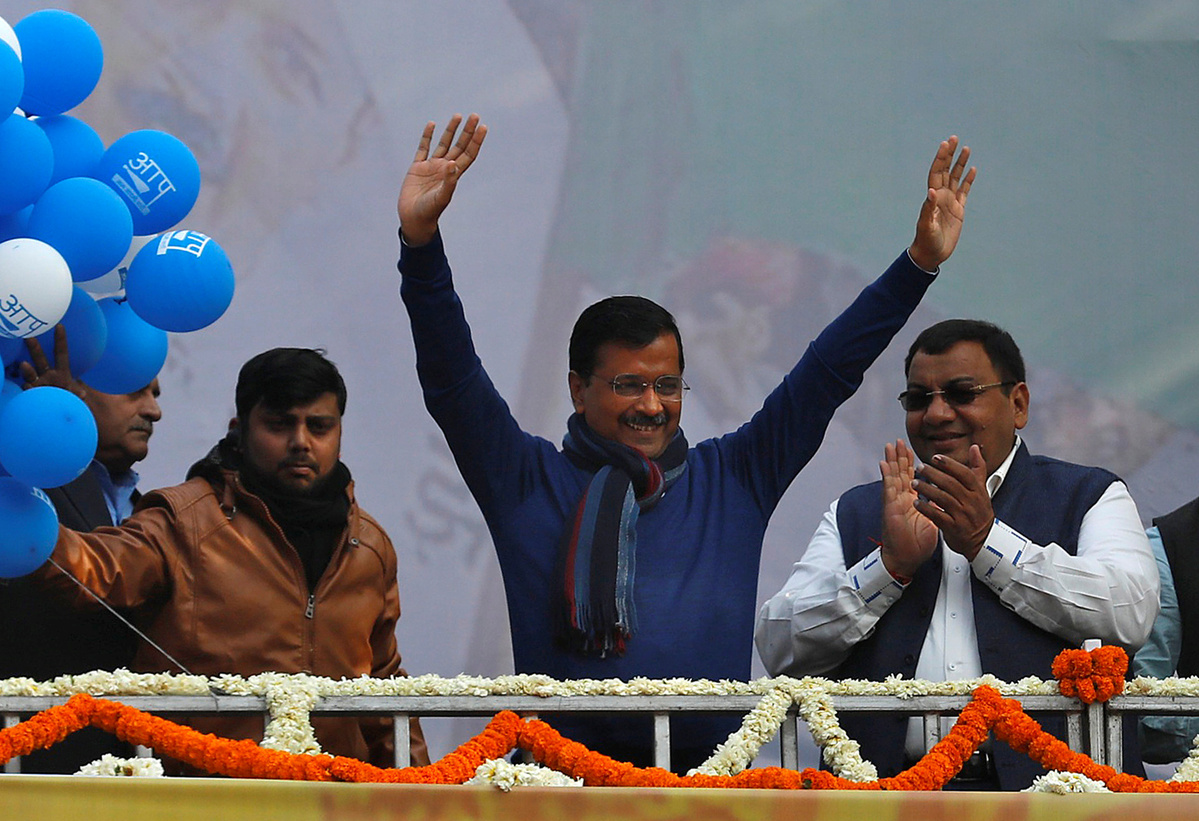Indian voters reject government’s 'divisive agenda' in crucial Delhi state elections
By Manoj Chaurasia in Patna, India | chinadaily.com.cn | Updated: 2020-02-13 11:38

The nationalist agenda of Indian's ruling party and government contributes to its third poll disaster since May although its national spokesperson said they fought in Delhi with all force and did its best. The state's voters cast in favor of development roadmaps instead.
The Bhartiya Janata Party (BJP) headed by Prime Minister Narendra Modi bagged only eight seats in 70-member Delhi assembly to finish at distant second behind 62 seats by the liberal Aam Aadmi Party (AAP) led by Chief Minister Arvind Kejriwal.
What was further significant, the AAP managed to get a lion's share of 53.57 percent votes, securing Delhi power for the third consecutive time. The Congress party which once ruled Delhi for 15 years got little over 4 percent votes. The BJP failed to perform even though analysts said Congress' vote share shifted to the BJP.
The Delhi elections had turned politically significant since this was the first major election being held after the contentious new citizenship law, and in a sense, was being widely described as a "referendum" of sort.
The BJP leadership engaged all top leaders in the poll campaign. Modi and his colleague Amit Shah, federal home minister and former BJP chief, themselves led the party campaign which held no less than 5,000 big and small rallies in Delhi in the last one month. Also engaged were all its federal ministers, at least six chief ministers of BJP/NDA-ruled sates, several former chief ministers, and some 300 party parliamentarians for 70 assembly seats. This amply indicated how the Delhi elections had become a matter of prestige for the BJP.
The BJP carefully crafted its entire poll campaign around the Citizenship Amendment Act and the issues of nationalism in a bid to polarize the voters along the communal lines, experts said.
The BJP had a lot of expectations for the Delhi elections. The party think-tank felt the citizenship law promising to grant citizenship to six religious communities, including Hindus, coupled with other issues such as abrogation of Article 370 granting special status to northern Indian state of Jammu and Kashmir and a promise to construct a grand temple for Hindus at Ayodhaya would lead to huge polarisation of Hindu votes and hugely benefit the party. But this calculation went entirely wrong.
The CAA passed by the Parliament in December last year aims to fast-track citizenship for "persecuted" Hindus, Parsis, Sikhs, Buddhists, Jains and Christians who arrived in India before Dec 31, 2014 from three Muslim countries, such as Pakistan, Bangladesh and Afghanistan. However, Muslim community was "excluded" from this list, triggering violent protests across the country. At least 25 people were killed in the violent protests which erupted in mid December 2019.
Very much against such protests in the national capital and across India, the BJP sought to project the protesters as "anti-national".
The campaign turned bitter when home minister Shah, addressing a rally, asked the masses to press the Electronic Voting Machine (EVM) button with such force that its "current" is felt at Shaheen Bagh, site of anti-citizenship law protest which Modi described as "not a coincidence, but an experiment".
The bitterness in BJP poll campaign touched a new high when another Indian minister Anurag Thakur exhorted the voters to "shoot down the traitors" at a party rally. Another BJP parliamentarian Parvesh Verma even cautioned voters against protesters staging sit-in at Shaheen Bagh. He promised to clear Shaheen Bagh from all protesters and bring down all mosques built on government land if his party comes to power.
"This election was an 'acid test' for the BJP since it had systematically raised the divisive agenda to divide voters along the communal lines but was outright rejected by the masses," prominent political analyst DM Diwakar said. "The poll outcome shows the masses want peace, development and communal harmony," he explains, suggesting the BJP to rework its poll strategy.
Neerja Chowdhury, another political commentator, says the BJP's poll campaign remained focused only around emotive issues while the AAP built its campaign around development, free power and water, health for all and free travel passes for women. "Depending too much on emotive issues proved counter-productive for the BJP," Chowdhury said.
This was the third time in quick succession that the BJP lost the state elections in the past four months. The party faced its first major setback when it failed to form its government in western Indian state of Maharashtra after getting majority in the state elections held in October 2019 as it refused to spare the throne to its ally Shiv Sena. Two months later, the eastern Indian state of Jharkhand too slipped out of its hand.
That the India's ruling party was able to improve its tally by just five seats in Delhi amply indicated how the general masses were annoyed at BJP's "negative campaign". People's anger can be gauged from the fact that barely eight months back, the BJP had made a clean sweep by bagging all the seven LS seats in the Indian National Capital Territory of Delhi.
Yet, the BJP still remains adamant on its stand. BJP spokesperson Sambit Patra said the winning election was another issues but so far as the citizenship law is concerned, this was part of his party's manifesto. "We will not drag our feet behind even by an inch over this issue," Patra said.
The writer is a freelance journalist for China Daily.
























